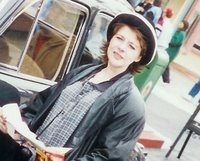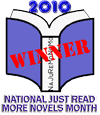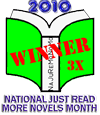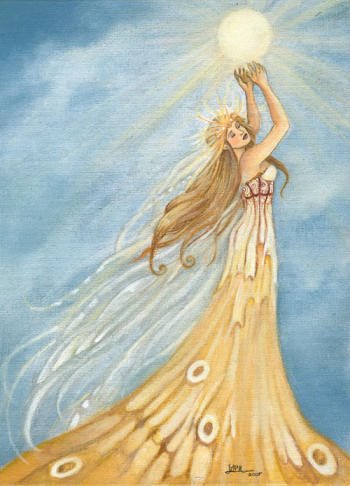 Essays. Webster's defines an essay as "a short literary composition on a particular theme or subject, usually in prose and generally analytic, speculative, or interpretative." I can't remember the last time I sat down and read an essay. College, I would presume, and it certainly wasn't for pleasure. But part of my goal for reading challenges is to try to "expand my reading horizons". So one of the books I picked for the Women Unbound Challenge was a book of essay called Couldn't Keep it to Myself by Wally Lamb and the Women of the York Correctional Institution: Testimonies from our Imprisoned Sisters (368 pgs, Harper Collins, 2003). I'm afraid this is going to be a rather long review, but even then, I don't think there is a way to do justice to this book.
Essays. Webster's defines an essay as "a short literary composition on a particular theme or subject, usually in prose and generally analytic, speculative, or interpretative." I can't remember the last time I sat down and read an essay. College, I would presume, and it certainly wasn't for pleasure. But part of my goal for reading challenges is to try to "expand my reading horizons". So one of the books I picked for the Women Unbound Challenge was a book of essay called Couldn't Keep it to Myself by Wally Lamb and the Women of the York Correctional Institution: Testimonies from our Imprisoned Sisters (368 pgs, Harper Collins, 2003). I'm afraid this is going to be a rather long review, but even then, I don't think there is a way to do justice to this book.
Wally Lamb, the bestselling author, was a teacher first. When he wrote his first two novels, they were both picked up by Oprah Winfrey and her book club, causing them to become instant successes. Because of the success, Lamb was forever being asked for speaking engagements or to support causes. And because he is such a nice man, he has an incredibly hard time saying no. In fact, Lamb had to write down his refusal on an index card and keep it next to the phone. It was the only way he could say no. But when the prison librarian at York Correctional Institution called to ask Lamb to lead a writing workshop at the prison, he couldn't find the card. And so he said yes.
A rash of suicide attempts had happened at York. The overall mental well-being of many of the prisoners was despair, and the staff there thought that using writing as a coping tool might be of value to the women housed at York. I used to keep a hand-written journal. I wish I knew why I stopped using it, to be honest. When I could put feelings on paper, it always made me feel lighter. In the way using this blog for my venting has lightened my mood, writing in a journal was indeed therapeutic for me. The same was thought about the women at York. Maybe if they could write down their feelings, it would make them feel better about themselves. And Lamb was asked to lead the workshop. But once the workshop had ended, Lamb was once again put on the spot. "Are you coming back?", they asked him. He gave each woman an assignment: Write an essay. Entrance to the next "class" was that essay. What started out as a committment that seemed like a burden, to something that fills him with hope and love: Lamb returned to teach another workshop. And he has not stopped returning.
What he came to realize, is that these women were more than just criminals. More than just their crimes. "There are things that need to be known about prison and prisoners. There are misconceptions to be abandoned, biases to be dropped. There are a heart and a mind that need opening. There are many. We are a paradoxical nation, enormously charitable and stubbornly unforgiving. We have called into existence the prisons we wanted. I am less and less convinced they are the prisons we need."
"To imprison a woman is to remove her voice from the world, but many female inmates have been silenced by life long before the transport carries them from the court house to the correctional facility. Because incest and domestic violence cut across the economic divide, women of all means are schooled in silence. Of the eleven contributors to the volume, eight have been battered and nine have been sexually abused, a statistic that reflects the norm for incarcerated women. Their essays, then, are victories against voicelessness -- miracles in print."
I think this book has two points. The first being, using writing as a tool for coping with the bad things in life is healthy. Each woman "grew" into a different person by giving voice to their pasts. It was a way to release the inner demons.
The second point being that the prison system is flawed. The eleven women that contributed essays to this book each has a story to tell. And each is equally heart-breaking. Most of these women were let down by society and by the system long before she committed any crime. It seems to me the chain of events leading up to their convictions were almost inevitable. Both of the above quotes come from Lamb himself, questioning the prison system itself. It's easy to believe that these women are criminals, and to just lock them up and throw away the key is the right thing to do. When you look at the system as a whole, it seems to work. But to break it down by an individual case by case scenario, the sheer wrongness screams out from the pages.
There is a short biography of each of the contributing authors in the book. Each of the essays are a look into the past -- to the life that was lived and events that led up to incarceration. But the biographies tell a bit more. You learn a bit about each crime that was committed and where each woman is today. Each woman's voice is distinct; each woman's writing varies. And yet, there is a common thread that runs through each essay: the violence and horrific childhood that shaped the lives of each woman. Here are just a few examples:
Convicted of Larceny by Embezzlement, Carolyn Adams' life has been one of mental health issues and pain. She was not only sexually abused by her father starting at the age of 6, but when she was in the 7th grade, she found herself pregnant. Not even understanding what was going on, she was sent to a home for unwed mothers until she could give birth. "I find the one that says 'Baby Boy May'. His face is pink and wrinkled and he's sucking on his tiny fist, eyes shut. I stare at him for a long time, memorizing each part: his perfect miniature feet, his tuft of blond hair, his tightly shut eyes. I can't connect the child lying here to the "it" I carried inside my body. This baby was the secret. He doesn't seem real. Just as he opens one dark blue eye, a had clamps onto my shoulder. 'Young lady, didn't you see that sign? Children aren't allowed on the nursery ward. Now scoot before you get into trouble'. " After her release from prison, Carolyn today volunteers at a wellness center for battered women, CRIS Radio for the Blind and a service center for the elderly. She continues to write to help her advocacy of the mentally ill.
Brenda Medina has been incarcerated since she turned 18 in 1993. She was convicted of homicide (gang related) and is serving 25 years without parole. Raised by her parents, her mother was mentally ill and beat her. She joined a gang at a young age to find someplace she belonged. She was known for being tough and stoic. " 'I'm not dying for nobody,' I said. 'No matter how many times they drag me over to seg'. He stopped bouncing and leaned forward. Looked me in the eye. 'You've got it backwards,' he said. 'That's exactly what you are doing. Every time you convince someone else what a hard case you are? Every time you earn yourself a ticket, or a lockdown? Your spirit dies a little more. They can make it pretty tough for you in here, Brenda, but they can't kill your spirit. Only you have the power to do that.' I had never cried in front of him before that day. Still incarcerated, Brenda completed her GED and has completed 36 hours towards an associates degree. She is a bilingual tutor. She is now a writer, photographer and editor for the York Voice, the inmate newsletter. She also designed, organized and implemented the first ever Latino Appreciation Week at York. Writing has become her "sanctuary".
Barbara Parsons Lane was convicted of manslaughter, due to emotional duress. When she was 6, she was molested by her grandfather -- who had molested her mother when SHE was a child. Her mother committed suicide years later, leaving an emotionally unstable daughter to pick up the pieces of her life. In her essay entitled Puzzle Pieces we learn a little more about why she has been incarcerated: "I am tired now, sick of puzzles and memories. My grandfather is long dead, and my mother, now, too. And I'm in prison for having taken the life of my husband, the man who molested my granddaughter, the child of my child." Lane has since earned an associate in science degree from the local community college, graduating with honors. She is a certified tutor and maintains her membership in the active support group, Survivors of Abuse and Struggles, a writing- and reading-based group for victims of battering. She is also deeply involved with the prison's PUP partnership, training dogs to assist special needs adults and children.
These are just a few of the voices you hear ringing out from this book. The final essay is written by Dale Griffiths, one of the teachers at York. She was instrumental in getting Lamb to come, and keeping him on as a volunteer. These are MY students. The ones who fell through the cracks at public schools. By my seventh year of teaching at York, I had gathered, edited and "published" four booklets of my students' writing -- stories describing worlds where love and hate blur and where sexual abuse, violence, and drug addiction are both commonplace and epidemic. I'd long known the statistical connection between childhood brutality and incarceration. Now I knew the writers, too. Each of those statistics has a name, a face, a history.
If you get a chance to read this book, I encourage you to do it. It is hard to read. Brutally honest and forthright, it tugged at my heart strings like nothing I've ever read before. I spent many a page openly weeping. I have never considered myself privileged. But I do realize now that a childhood like mine is a treasure. Although I didn't feel like it was exciting, and I couldn't wait to grow up, I was certainly lucky not to have to deal with the issues that these women did. This book also makes me hug my kids just a little tighter each night, and say "I love you" a couple extra times a day. No child should have to endure the violence these women did. If this book does nothing else, it should give you a reason to look at the injustice that is indeed the American prison system. Heart-breaking and gut-wrenching, this book will leave you, the reader, wanting to do more. I know I do. Now, I just need to find a way to channel that desire into action. A 5-star review, and then some. 5/5
Tuesday, January 26, 2010
Essays - Couldn't Keep it To Myself
Posted by
Stephanie
at
2:35 PM
![]()
Labels: 'L' Authors, 5 star review, Book Review, Essay, Women's Unbound Reading Challenge
Subscribe to:
Post Comments (Atom)





























12 comments:
What an incredibly cool and awesome find! Thanks for sharing.
There's nothing wrong with writing essays. I think its good to consider books more deeply. In fact I started a new section on my website for essays- Belles-Lettres.
Oh Stephanie, this book sounds so good. So heartbreaking and so powerful. This is definitely a must-get-my-hands-on book. Thanks for the fabulous review.
I have this on my shelf! I am a little weirded out as I would have bet my life on the fact that I got it after a review of it here on YOUR blog, months ago. But, er, I guess I was completely wrong... :-)
I borrowed this from a friend (more like she forced it on me) and it remains one of the best books I've ever read. ~ L
OMG, this looks brilliant!! I've definitely added this one to my list!!
Somehow I've never been drawn to Lamb's fiction (I don't know why, really), but this book most definitely appeals to me. Especially because I feel the same way about prisons and how society deals with people who have committed crimes. Thanks for the excellent review!
I'm sold on this one. It sounds amazing. Thanks for the great review.
You've convinced me, I've now added this book to my wish list. It appears that there is a second collection of essays? I'll Fly Away: Further Testimonies.. ?
Have you read She's Come Undone by Wally Lamb? I'm not kidding, it's unbelievable. If you ever thought men cannot understand women, it will change your mind. I'm very picky about rating books as UNREAL but really it is.
Awesome review. I'm so intrigued. It sounds a little like True Notebooks by Mark Salzman, which I loved.
Apna Showroom Baby Girls' Plastic Hair Clips Claw Clutcher (Multicolour)-35 Pieces Girls/women
This is the great journey sweet heart.
Post a Comment